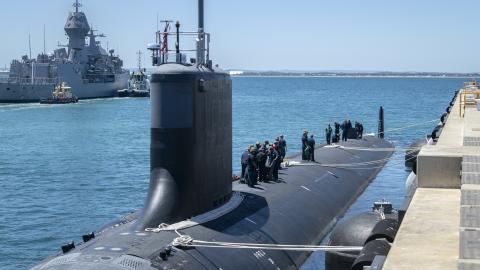In these pages last week, Paul Keating accused our security agencies and policy community of being dominated by “little Americans” subserviently elevating American interests and perspectives above that of our own. Referring to them also as “Austral-Americans”, Keating argued their blind faith in what he termed an Atlantic power undermined our sovereignty, interests, and standing in Asia.
Keating characterises America as a fading power bound to an ocean half a world away. In fact, it is the leading material power in the Pacific Ocean and Asia. Moreover, according to all credible measures, the Asian nation most trusted by others in strategic terms and with the highest soft-power reserves is Japan. Tokyo arguably relies even more on the American alliance than Australia. Clearly, pursuing a closer relationship with Washington is consistent with enhancing one’s standing in our neighbourhood.
What about AUKUS and the issue of subjugation by America? This is a strange charge to make because a much more advanced superpower is giving Australia access to some of its most closely guarded and valuable military technology and know-how. It is not something great powers normally agree to, even with respect to allies. This leads to the question of why Australia is being granted special privileges and what America is getting out of this and other arrangements.
This is where geography, maths and geopolitics come into play. America has enormous stakes and interests in the region but is a geographically distant power from Asia. Each year, China spends more on its military than the rest of Asia and Oceania combined and threatens to use this and other coercive means to revise territorial boundaries, reshape institutional arrangements and how nations ought to behave. Numbers tell us there is no balance without America. But the latter needs the assistance of regional allies much more now than it has in the past.
This is the realisation behind AUKUS and the American mindset more generally. It is not about keeping one’s allies under the thumb but empowering them. America, Australia and others like Japan agree China poses a comprehensive challenge and threat. Sharing and jointly developing military technologies and assets, pooling resources, dispersing forces, creating secure supply chains, and more broadly ensuring allies work cooperatively rather than at cross-purposes to each other explains America’s interest in Australia, and vice-versa. Therefore, it is not a story of superpower overreach or an attempt to exploit gullible nations. On the contrary, America is finally accepting that its power and reach has limitations, and a strong Australia is essential.
In this sense, there are healthy dollops of self-interest behind the policies of the two countries. From the Australian side, if sovereignty is defined as a nation’s ability to guarantee the exercise of rights and privileges, then there is no substitute for material strength in the face of an advancing and coercive Chinese power.
A more independent security policy will not make us stronger. A porcupine strategy, that is becoming an inward-looking and prickly power, is blind to the reality that what happens in East Asia decisively shapes the extent to which we can function as a sovereign nation. We should maximise our individual and collective agency to shape events to our north before it is too late.
This is why there is a growing army of “little Australians” – fans of ours – in American institutions of power and influence such as the White House, congress and major think tanks. If referred to as such, these little Australians in America would wear the designation with pride. They are unabashed admirers and supporters of where the Turnbull, Morrison and Albanese governments have taken us because a proactive and formidable Australia augments America’s staying power in the region.
Finally, what does the region think about all this? Over the past decade, it has observed what happened when other American allies such as South Korea and The Philippines attempted a tilt towards China and away from America. The more they tried to smooth over differences to seek an accommodation with China, the more coercive and demanding Beijing became. No wonder current administrations in Seoul and Manila have subsequently reversed course.
For those other regional countries demanding they should never be forced to choose between great power rivals, the open secret is that this is only feasible so long as America and allies such as Australia and Japan do the hard yards placing constraints on how China wields its power. AUKUS and other arrangements such as the Quadrilateral Security Dialogue of America, Japan, India and Australia have become indispensable in this respect. Remove those constraints and unpalatable choices will be made for them by Beijing.
This then is the fallacy of perspectives such as Keating’s that the so-called little Americans in our institutions are subservient to a distant, self-interested superpower while harming Australia’s reputation in the region at the same time.
Most Asian countries are quietly willing on the so-called little Americans in Australia, and the little Australians in America. This is because their freedom of manoeuvre and action greatly depends on our success.















